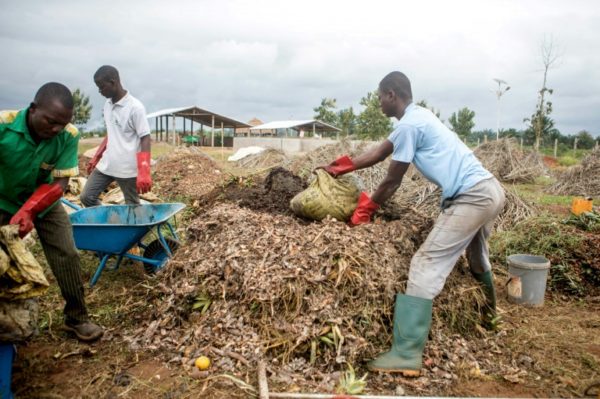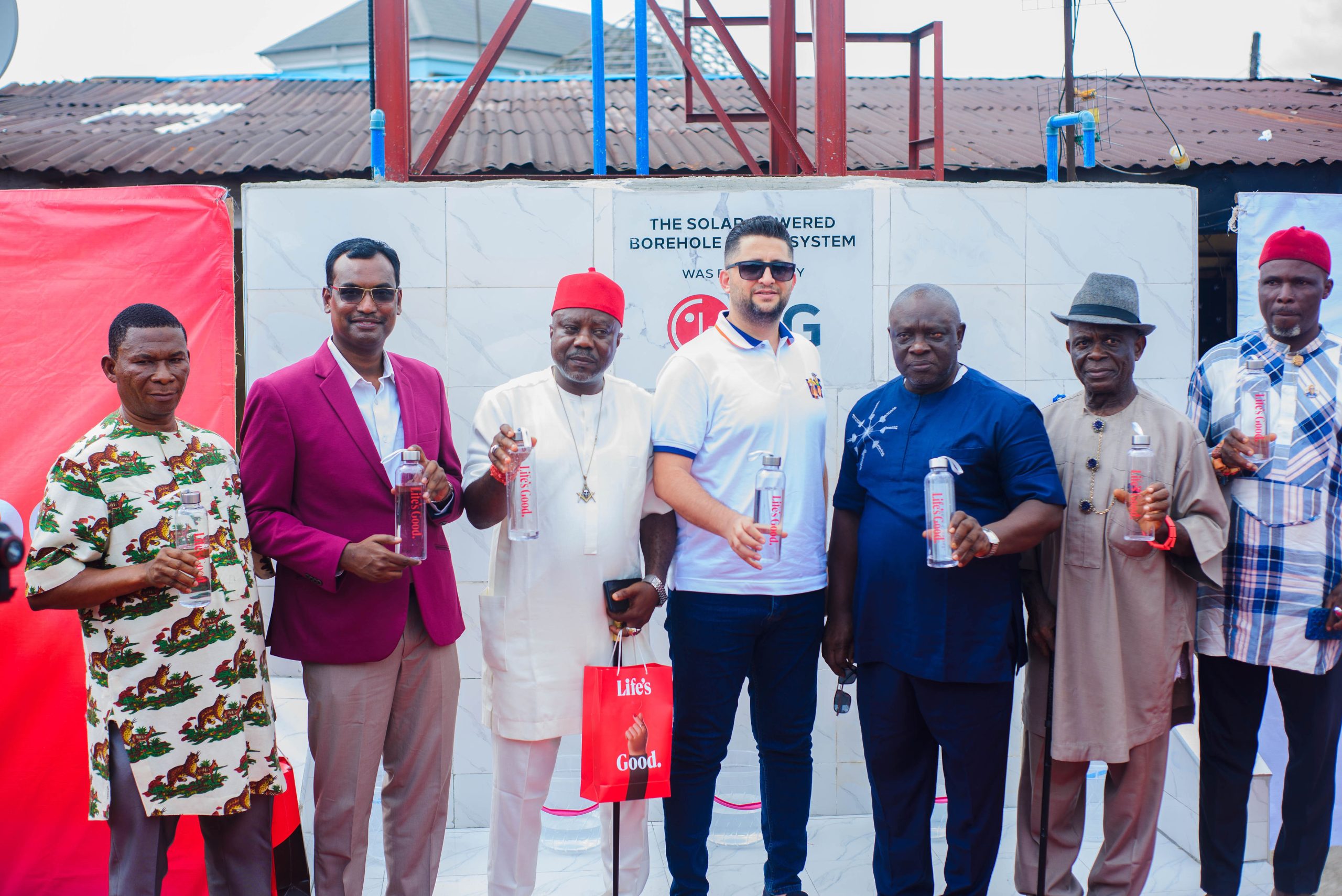Corporate Citizenship
Waste turns to gas and cash in Benin Republic

Garbage has never smelled so sweet for a small village in southern Benin since it opened a pilot waste treatment centre to turn household rubbish into gas — and cash.
“Our trash has become gold. We no longer throw it into the bush. We use it to make money,” beams Alphonse Ago, who lives next to the centre in Houegbo village.
ReBin, a Swiss foundation for sustainable development, built the 1.3-hectare (3.2-acre) facility, which every week turns around six tonnes of organic waste into 200 cubic metres of biogas — saving some 164 tonnes of wood from being used to make charcoal.
The centre, which opened late last year, also plans to produce around 400 tonnes of organic fertiliser per year.
So far, around 100 households in the area have signed up to the scheme to deposit their waste at the centre on a daily basis.
Every 10 kilogrammes (22 pounds) of waste fetches 250 CFA francs (around 50 euro cents, 57 US cents), paid either in cash or credit — to buy biogas.
The fuel is a precious commodity in a rural region where electricity remains scarce.
Agnes Avoce, a shopkeeper and mother of five, proudly straps a large plastic bag of the gas onto her back.
Biogas, she says, is much cleaner and more efficient for cooking than charcoal — which “darkens the pots and makes me sick” — and she is more than happy to make the switch.
Avoce is not alone; five other women are waiting to pick up gas.
“There are queues here since we opted for biogas,” another customer says.
Symphorien Adonon, 35, drops off a week’s worth of carefully sorted waste, smiling as he pockets his cash payment.
“Now I have enough to do the shopping for dinner,” says Adonon, who drives a motorcycle taxi.
The centre has treated more than 20 tonnes of waste since it began operations late last year.
In addition to the customers’ household waste, there is also rubbish collected by a local non-government organisation, Astome.
The NGO’s chief, Florent Gbegnon, says he used to collect it on a push cart, but he now uses a tricycle provided by the centre.
“It’s a huge relief,” he says as he dumps a load of pineapple skins. “Pushing the cart was a real burden.”
It was the massive amounts of waste such as pineapple skins that originally caught the attention of ReBin’s founder, Mark Giannelli, and inspired him to set up the treatment centre in Houegbo.
“I saw this not as a problem, but as an opportunity, and I thought it was a goldmine,” Giannelli told AFP.
Benin is Africa’s fourth-biggest exporter of pineapples. And in Houegbo, which has one of the busiest markets in the region, local sources estimate that more than a tonne of waste is generated every day from that fruit alone.
Giannelli told AFP that he had been searching for a potential site for his project in Benin’s West African neighbours Ghana and Togo.
But it was the enthusiasm with which the locals embraced his idea that finally convinced him to set up the waste treatment centre here, he said.
The goal is to establish “a real economy that serves the population and protects the environment,” he says. “We have to take the problems locally and adapt them to local solutions.”
Once the necessary expertise has become more firmly established in Houegbo, Giannelli hopes to extend the project to larger municipalities and let local entrepreneurs run it.
The centre’s director, Sewai Mardochee, suggests duplicating it in all of Benin’s 77 municipalities.
“We can then create jobs and clean up our living environment by reducing the use of firewood and coal,” he said.
Nicolas Hounje, a retired official, has put himself forward to take over the company.
“We did not know here that garbage can become a source of happiness,” he says. (NAN)
Corporate Citizenship
LG Electronics Commissions Solar-Powered Boreholes in Two Communities in Port Harcourt

LG Electronics announces the commissioning of solar-powered boreholes in the Nkpogu and Elekahia communities in Port Harcourt, Rivers State, Nigeria. This initiative reflects LG’s continued commitment to sustainable development, community empowerment, and improving basic living conditions for underserved populations.
The newly installed boreholes are powered by solar energy, ensuring a reliable, environmentally friendly, and cost-effective water supply. The solar-powered system eliminates dependence on diesel generators and Nigeria’s often unstable power grid, allowing the boreholes to operate consistently with minimal maintenance costs. This innovative project supports LG’s mission to create a better life through technology while minimizing environmental impact.
“LG Electronics is honored to support the Nkpogu and Elekahia communities with a solution that addresses a fundamental need – access to clean water. This initiative is part of our broader commitment to corporate social responsibility, sustainability, and enhancing the quality of life in the communities we serve,” said Hari Elluru, Head of corporate Marketing, at LG Electronics Nigeria. “We hope that this project will significantly improve daily living standards, reduce the risk of waterborne diseases, and provide these communities with a reliable source of clean water.”
The Clean Water Initiative by LG Electronics Nigeria is a testament to the company’s unwavering commitment to enhancing the quality of life for communities in need. By addressing the fundamental necessity of clean water, this initiative aims to improve daily living standards and plays a crucial role in reducing the prevalence of waterborne diseases that threaten public health. Through its dedication to corporate social responsibility and sustainability, LG Electronics is paving the way for a future where access to reliable clean water is no longer a privilege but a fundamental right for all. This holistic approach not only reflects the company’s values but also inspires hope and encourages collective action towards a healthier, more sustainable environment for every individual, he said.
Chieftains, local community leaders and members of both communities including the school authorities were also present at the ceremony, acknowledging LG’s efforts in supporting community development in Port Harcourt. In remarks made by Eze (Hon) Okechukwu Abbey, Eze Nchemini of Rebisi & Secretary, Port Harcourt city council of traditional rulers, he expressed gratitude for LG’s tangible support in improving essential infrastructure, thus contributing to economic and social progress in the community.
The installation of the solar-powered boreholes builds on LG Electronics’ broader vision of driving sustainable development and fostering social impact in all its markets. The company has pledged to expand similar projects across Africa as part of its long-term commitment to environmental stewardship and community empowerment.
In his Opening Speech, Branch Manager, Fouani Nig. Ltd, Mr. Mahmoud Youssef said “Access to clean and safe drinking water is fundamental to health and well-being. Water keeps you hydrated, it flushes out toxins, sends nutrition around your body, and aids in digestion. By using solar energy, this project will remain efficient and cost-effective over time, ensuring that Nkpogu has a reliable water source for many years to come.” He emphasized the importance of community involvement in maintaining the system, stating that local residents would be trained to manage and oversee the operations. “Together, we can create a sustainable future where every household has access to this vital resource,” he concluded, inspiring hope among the attendees.
The project aligns with Nigeria’s Sustainable Development Goals (SDGs), specifically SDG 6: Clean Water and Sanitation. LG Electronics believes that by investing in clean water solutions, it is not only supporting healthier communities but also contributing to a sustainable future.
The overwhelming enthusiasm demonstrated by community members and students reflects a collective spirit that thrives on collaboration and generosity. Their eagerness to engage with the project highlights not only the importance of community involvement but also the profound impact that shared resources can have on local initiatives. The satisfaction expressed over the donated items underscores a strong sense of gratitude and appreciation, further galvanizing support for future endeavors.
Together, these elements reveal a vibrant community poised for growth, driven by a shared vision and an unwavering commitment to enhancing their environment. This dynamic interplay of excitement, gratitude, and active participation serves as a powerful reminder of what can be achieved when individuals unite for a common cause.
Corporate Citizenship
Heirs Insurance Group Announces Winners of N8 Million Essay Championship Scholarship

L:R- Charles Odii DG, SMEDAN; Alhaji Misbau Umar Yola, Non-Executive Director, Heirs General Insurance; Niyi Onifade, MD/CEO, Heirs Life Assurance and the Group’s Sector Head; Hephzibah Chidi, Winner, 2024 Heirs Insurance Essay Championship; Tony Aniemeke, MD/CEO, Heirs Insurance Brokers and Ifesinachi Okpagu, Chief Marketing Officer, Heirs Insurance Group.
Heirs Insurance Group, Nigeria’s fastest-growing insurance Group, has announced the winners of its 2024 Essay Championship, who will be awarded N8million scholarship. The winners were announced at a grand ceremony at the Transcorp Hilton Hotel, Abuja, as part of an all-expense paid event hosted by the Group for the finalists, their parents and school representatives.
The winner, Hephzibah Chidi from Seacrest Preparatory in Rivers State, who won the first-place position and a N5million scholarship, captivated the judges with her winning essay and presentation of “The Story of My Hero”. In addition to her N5M Scholarship, Hephzibah Chidi’s school, Seacrest Preparatory was awarded a N1M grant to support an educational project.
The other winners include Pemisire Owolabi from Quest College in Oyo State, who won second place with a N2million scholarship, and Mariam Raheem from Isador Model School in Lagos State, who won the third-place position with a N1million scholarship.
All winners received their awards in the presence of their parents and school representatives, distinguished guests, including, Director General, Small and Medium Enterprises Development Agency of Nigeria (SMEDAN), Charles Odii, and hosts of the event – Niyi Onifade, MD/CEO, Heirs Life Assurance and the Group’s Sector Head; Tony Aniemeke, MD/CEO, Heirs Insurance Brokers, among others.
This year’s Championship attracted nearly 5,000 participants from Junior Secondary Schools nationwide, all showcasing exceptional creativity and innovative ideas. The Championship highlights Heirs Insurance Group’s unwavering commitment to supporting education and promoting financial literacy.
Speaking at the event, Niyi Onifade, MD/CEO, Heirs Life Assurance and Sector Head, Heirs Insurance Group, said: “At Heirs Insurance Group, we understand that education is not only a pathway to a better future but also a catalyst for financial empowerment. Through this Championship, we are nurturing young talent and bridging the financial literacy gap, fulfilling our purpose of improving lives and transforming Nigeria”.
Speaking further, Onifade praised the outstanding efforts of all participants, “I am proud of the creativity and critical thinking displayed by our finalists, as well as every student who submitted an essay. These young minds are shaping the future of our country, and we are proud to support them.”
A distinguished panel of academic professionals, led by a Professor of English, rigorously evaluated each entry. The top 15 essays advanced to the next round of assessments, from which the top 3 finalists were chosen to compete in the grand finale. To ensure the highest standards of fairness and transparency, Deloitte & Touche was engaged as an independent Quality Assurer throughout the grading process, guaranteeing a free and fair evaluation for all participants.
The Heirs Insurance Essay Championship is a key component of Heirs Insurance Group’s Corporate Social Responsibility (CSR) efforts, geared towards enhancing the quality of education for the next generation. The Championship also highlights emerging talent, bringing parents and children closer to insurance through extended financial literacy workshops.
Corporate Citizenship
ATIDI Supports Education for Displaced Children in Burundi through its CSR Program

The African Trade & Investment Development Insurance (ATIDI) has announced a financial contribution of $40,000 to Street Child in Burundi. This contribution is aimed at improving educational opportunities for displaced children in Gatumba and reflects ATIDI’s dedication to tackling critical social issues and promoting sustainable development. Through its CSR programs, ATIDI is committed to advancing sustainable development, addressing pressing social challenges, and fostering economic stability across Africa.
Burundi has recently experienced severe climate change-related disasters, including heavy rains, strong winds, hail, and rising Lake Tanganyika waters, causing frequent flooding. This has led to repeated displacement of families, particularly affecting children and adolescents who represent over 60% of internally displaced persons. The education sector has been severely impacted, with at least 80% of schools in Gatumba suffering from flooding, damaged classrooms, and lost educational materials, putting over 30,000 children at risk of not completing their school year.
Commenting on the donation, ATIDI CEO Manuel Moses said, “Education is the cornerstone of sustainable development, and we at ATIDI are committed to making a meaningful difference in the lives of children in Burundi. By supporting the construction of these classrooms, we are investing in the future of these young minds and fostering long-term growth across the continent. We are proud to partner with Street Child Social Action for Development (S.A.D.) for this vital project.”
ATIDI’s support has therefore facilitated the successful construction and equipping of six permanent classrooms in two primary schools, “Kigwati” and “Village du Développement.” This initiative now provides educational access to at least 300 children affected by the Gatumba floods. The project aligns with Burundi’s National Development Plan for 2018 -2027 and the Ministry of National Education and Scientific Research’s Sectoral Plan for 2020 – 2023.
Street Child Country Representative in Burundi Jolien Van den Broeck thanked ATIDI for the generous support, adding that the donation was more than just building classrooms, but restoring hope and creating opportunities for displaced children in Gatumba.
“At Street Child, we believe that every child deserves the chance to learn, no matter their circumstances. Together with ATIDI, we are committed to making a lasting impact on the most vulnerable communities in Burundi,” Broeck said.
Beyond constructing classrooms, the project emphasizes the promotion of education for all children, community mobilization, and active participation in regular and effective monitoring. The objective is to ensure that the local community, administration, and stakeholders understand the merits of the project, fostering a sense of ownership. This collaborative approach will engage all parties in monitoring the school’s functioning and maintenance, resulting in a sustainable impact and guaranteeing quality education for all.
-

 Afripreneur1 day ago
Afripreneur1 day agoRedefining Real Estate Marketing: An Interview with Imelda Usoro Olaoye, Founder of Thinkmint
-

 Afripreneur1 day ago
Afripreneur1 day agoOluchi Anoruo on building SmartPharm and addressing access to healthcare products
-

 Economy1 day ago
Economy1 day agoMeta Hosts its First Youth Summit in Nigeria to Drive Innovation and Empowerment
-

 Technology1 day ago
Technology1 day agoLG’s Brand Reinvention: A Global Success Story
-

 Afripreneur4 hours ago
Afripreneur4 hours agoMeet Datari Ladejo, the digital strategist helping brands thrive in the digital economy





